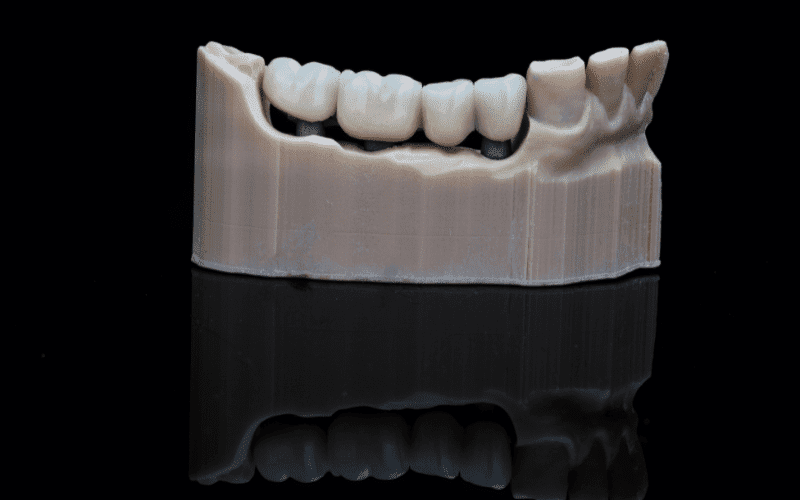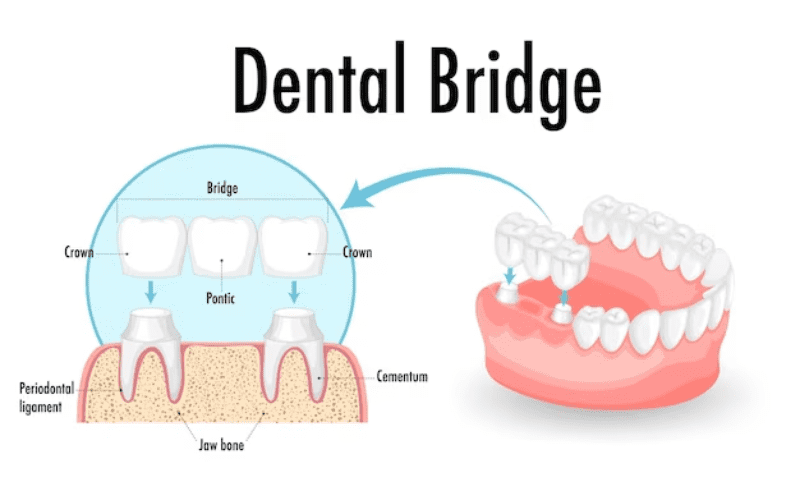Call: (810) 674-3060
Things To Know Before Considering a Dental Bridge

What is a Dental Bridge?
A dental bridge is a fixed dental restoration that replaces one or more missing teeth by bridging the gap between adjacent natural teeth. It consists of artificial teeth, called pontics, anchored to crowns placed on the healthy teeth on either side of the gap.
Bridges restore aesthetics and chewing function and prevent dental issues associated with tooth loss. Traditional bridges are cemented in place, while implant-supported bridges use dental implants for support.
This procedure enhances oral health and overall well-being by maintaining tooth alignment and preventing problems arising from gaps in the dental arch. Regular oral hygiene is crucial for bridge longevity.
Types of Dental Bridge
There are several types of dental bridges, each designed to address specific needs.
1. Traditional Dental Bridges: These are the most common type, consisting of pontics (artificial teeth) held in place by dental crowns on adjacent natural teeth.
2. Cantilever Bridges: Similar to traditional bridges, but supported by a dental crown on only one adjacent tooth. They are less common and not recommended for areas with significant biting force.
3. Maryland Bridges (Resin-Bonded Bridges): Pontics are attached to the adjacent teeth with metal or porcelain wings rather than crowns. This option is more conservative but may not be suitable for all cases.
4. Implant-Supported Dental Bridges: Supported by dental implants surgically placed in the jawbone. This type is highly stable and doesn’t require support from adjacent natural teeth.
Choosing the right type depends on factors like oral health, the location of missing teeth, and individual needs.
Benefits of Dental Bridges
1. Aesthetic Improvement: Dental bridges restore a natural appearance to your smile by filling in gaps left by missing teeth. The artificial teeth (pontics) are designed to match the color and shape of your natural teeth.
2. Functional Restoration: Bridges help to restore proper biting and chewing functions that may be compromised due to missing teeth. This, in turn, improves your ability to eat various foods and maintains the alignment of your remaining teeth.
3. Prevention of Dental Issues: By filling the gap left by a missing tooth, bridges help prevent issues such as the shifting of adjacent teeth, which could lead to misalignment and bite problems. They also contribute to maintaining overall oral health.
4. Speech Improvement: Missing teeth can affect speech, leading to difficulties in pronunciation. Dental bridges can aid in restoring clear and articulate speech by filling the gaps and supporting the surrounding structures.
5. Distribution of Bite Forces: Bridges evenly distribute the force exerted during biting and chewing across the remaining natural teeth. This helps prevent excessive stress on specific teeth, reducing the risk of wear and tear and potential damage over time.
Risks and Side Effects
1. Tooth Sensitivity: Preparing natural teeth to support dental crowns in a bridge can lead to increased tooth sensitivity, especially in hot or cold temperatures. This sensitivity may persist for some time after the bridge placement.
2. Gum and Tissue Irritation: A dental bridge may sometimes irritate the surrounding gums and soft tissues. Proper oral hygiene and regular dental check-ups are crucial to address and prevent such issues.
3. Potential for Decay: While the artificial teeth in a dental bridge cannot decay, the natural teeth supporting the bridge can still be susceptible. Maintaining good oral hygiene, including regular brushing, flossing, and dental check-ups, is essential to prevent decay around the bridge.
4. Bridge Failure: Dental bridges can fail over time for various reasons, such as wear and tear, loosening of crowns, or issues with supporting teeth. Regular dental examinations are necessary to identify and address potential problems early on.
5. Bone Loss (with Traditional Bridges): In cases where natural teeth support the bridge, the absence of tooth roots may lead to bone loss over time. This is not a concern with implant-supported bridges, as dental implants stimulate the jawbone, preventing deterioration.
Maintenance and Care for Dental Bridges
1. Regular Oral Hygiene Practices: Maintain good oral hygiene by brushing your teeth, gums, and tongue at least twice daily using fluoride toothpaste. Flossing between the bridge and under the artificial teeth is crucial to remove plaque and prevent gum disease.
2. Use of Specialized Tools: Consider using interdental brushes or floss threaders to clean hard-to-reach areas around the dental bridge. Water flossers can also be effective in flushing out debris and bacteria.
3. Regular Dental Check-ups: Schedule regular dental check-ups and cleanings to monitor the condition of the dental bridge and address any issues early on. Your dentist can assess the bridge’s integrity, check for signs of decay, and provide professional cleaning.
4. Avoid Harmful Habits: Refrain from habits that can potentially damage the dental bridge, such as chewing on complex objects, biting on ice, or using teeth as tools. These actions can lead to fractures or dislodgment of the bridge.
5. Healthy Choices: Adopt a healthy lifestyle, including a balanced diet and avoiding excessive sugar consumption. This not only supports overall oral health but also helps prevent decay around the bridge and maintains the longevity of the dental restoration.
Wrap Up!
In conclusion, Dental Bridges In Burton offers a reliable solution for restoring smiles and oral function. At Burton Family Dental, our team emphasizes the importance of regular care to ensure the longevity of your dental bridge.
With meticulous maintenance, including proper oral hygiene and routine check-ups, you can enjoy your bridge’s aesthetic and functional benefits. Trust Burton Family Dental for comprehensive dental care in Burton.
Smile confidently and chew comfortably – schedule your bridge consultation today. Your perfect smile awaits at Burton Family Dental!


